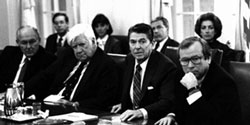African people should not forget Grenada (FCN)

NASHVILLE (FinalCall.com) – Before President George W. Bush invaded Iraq without United Nations authorization and in violation of Geneva Conventions, President Ronald Reagan similarly invaded the Caribbean island nation of Grenada.
The lesson to be learned from looking back on that invasion, according to a former high ranking official of the deposed Grenadian government, is found by looking at global geo-politics.
“Don’t underestimate the power of the strategic interests of the superpowers,” Don Rojas, press secretary to Grenada’s Prime Minister Maurice Bishop from 1979 until 1983, told Black columnists and commentators gathered here for the annual Trotter Group convention Oct. 22. He is founder of The Black World Today and The Black World Radio Network Internet portals, and the former director of Communications of both the National Association for the Advancement of Colored People and the National Urban League.
“The essential lesson is that proceeding on the path of national self-determination by any country under the so-called sphere of influence of the United States is a tricky, dangerous and challenging proposition,” said Mr. Rojas.
Under the pretense of protecting about 700 U.S. medical students there–students who, by most accounts, were never in any real danger–Mr. Reagan ordered the U.S. military invasion of the small island on Oct. 25, 1983. Many analysts argue that Mr. Reagan used the invasion of the militarily weak West Indian nation to deflect public outrage from the bombing of the U.S. Marine Corps barracks in Beirut, Lebanon, just two days before, on Oct. 23, in which 241 U.S. personnel were killed.
In 1979, Mr. Bishop and his New Jewel Movement toppled the brutal and corrupt dictatorship of Prime Minister Eric Gairy. The popular and charismatic Mr. Bishop wanted to bring democracy back to the island and, in his words, strive to move toward a “new sociopolitical and economic path to development.”
After Mr. Reagan was elected, relations between the U.S. and Grenada became strained over Mr. Bishop’s decision to strengthen his country’s ties to Cuba and the Soviet Union. With Cuban help, Grenada began constructing a 10,000-foot runway at its airport to accommodate modern passenger airliners and to enable the development of the country’s tourist industry.
Mr. Reagan viewed the runway, in geo-political terms, as a potential staging area for sophisticated military aircraft, including Soviet MiGs. “It is not nutmegs that are at stake in Central America and the Caribbean,” said Mr. Reagan at the time, “it is America’s national security.”
But most observers, including one Republican of West Indian descent, who was appointed to a top position at the Department of Housing and Urban Development (HUD), and later to a diplomatic post by Mr. Reagan himself, agree that the events in Grenada the week of the invasion were tragic.
“I think that Maurice Bishop would have been one of the shining lights, sons of Africa, who would be now leading a nation which was not only populous and an example of egalitarianism,” St. George Crosse told the Trotter Group. He served at that time as Mr. Reagan’s personal representative and Special Ambassador to the Caribbean island of St. Kitts-Nevis when that nation gained its independence from Britain.
But Mr. Reagan’s actions now pale in comparison to Mr. Bush’s invasion this year of Iraq, according to one analyst. “Bush Jr. has taken what Reagan did in 1983 and made it a policy, made it something official, made it the main trajectory of U.S. policy,” Phyllis Bennis, a fellow at the Institute for Policy Studies, told The Final Call in an interview.
“I think what we’re dealing with now is Grenada-on-steroids, if you will. This is Reagan-on-steroids. This is making a doctrine out of something that, at the time, was viewed as shocking. There was international outrage. Now, there is international outrage, but it’s muted by fear,” she continued.
“The invasion of Grenada was in some ways a symbolic act to everyone except the people of Grenada,” said Ms. Bennis. “But it was designed to show to the world that the U.S. was going to be the biggest and the toughest kid on the block.”
“Of course, there is the question also of the United States hegemony in the Third World, but particularly Latin America and the Caribbean, which is within such close geographic proximity to the U.S. that they won’t tolerate it,” said Mr. Rojas. “They simply won’t tolerate another so-called Cuba in their part of the world, the Western Hemisphere. So there are a lot of important lessons.
“I am eternally honored and grateful to have had the opportunity that was offered to me by Maurice Bishop to have served the Grenadian people. It was one of the most exciting and rewarding chapters in my life. I have no regrets at all,” said Mr. Rojas.












